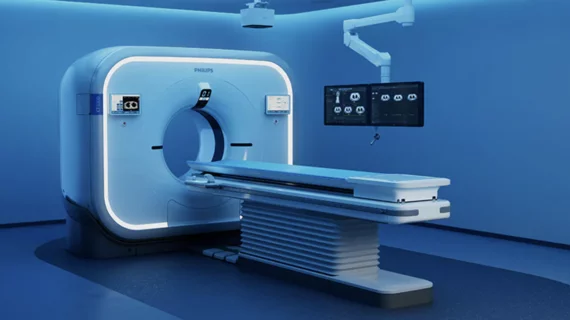New AI-enabled CT system is officially available in North America
Philips’ newest CT scanner made its North American debut during the annual meeting of the Radiological Society of North America, and the latest version is equipped with features aimed at addressing some of the biggest pain points of both radiologists and technologists.
The CT 5300 system has been in use in Europe since Spring but is now available to organizations across North America. The artificial intelligence-enabled system is said to improve patient throughput, increase scan consistency and reduce radiation exposure and contrast dosage. These improvements are owed to Philips’ CT Smart Workflow, which comes equipped with an extensive suite of AI-enabled ‘Precise’ software applications.
“The productivity and diagnostic confidence enhancements that AI can deliver to CT imaging empower care teams and ease departmental workflow, helping to mitigate today’s chronic shortage of highly skilled radiologists and technicians,” CT Business Leader at Philips, Dan Xu, said in a release.
According to Philips, the camera-based Precise Position reduces manual positioning time by up to 50% compared to standard preparation, which, in turn, improves user-to-user consistency by as much as 70%. Its AI-enabled image reconstructions allow for a significant reduction in radiation doses and improved contrast visualization using less volume, helping to reduce unnecessary waste.
Combined with a suite of anatomy-specific AI applications that streamline the diagnostic process starting with the scan itself to post-processing and reporting, Philips estimates that all the updates integrated into this latest CT system will enable departments to see around seven or more additional patients per day. Techs operating the scanner will also have 24/7 remote access to expert technologists and radiologists on standby to answer questions and assist with exams in real-time when needed.
“By equipping the CT 5300 with our unique NanoPanel Precise detector and ultra-low noise Precise Image reconstruction technology, together with our latest AI-driven CT Smart Workflow solutions, we are integrating hardware, software, and AI to make high-quality care more productive, cost-effective, and widely accessible,” Xu said.
RSNA kicked off Sunday at McCormick Place in Chicago and is set to conclude on Thursday, December 5.
Learn more about Philips’ latest CT system here.

